Comprehensive Guide to Garden Maintenance in Cleaners KT6
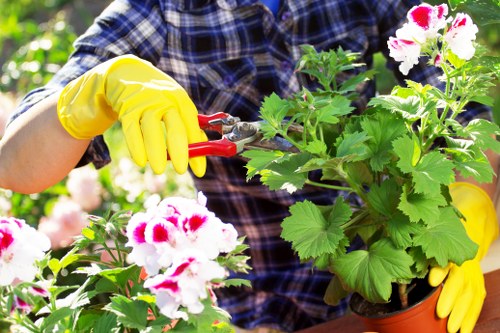
Introduction to Garden Maintenance
Maintaining a beautiful garden in Cleaners KT6 requires a blend of regular care, attention to detail, and the right techniques. Whether you're a seasoned gardener or a beginner, understanding the fundamentals of garden maintenance can transform your outdoor space into a thriving paradise.
Garden maintenance is not just about aesthetics; it's also about creating a healthy environment for plants to grow. Proper maintenance practices ensure that your garden remains vibrant, resilient, and free from common pests and diseases.
In this guide, we'll delve into various aspects of garden maintenance specific to the Cleaners KT6 area, providing you with actionable tips and strategies to keep your garden in top shape all year round.
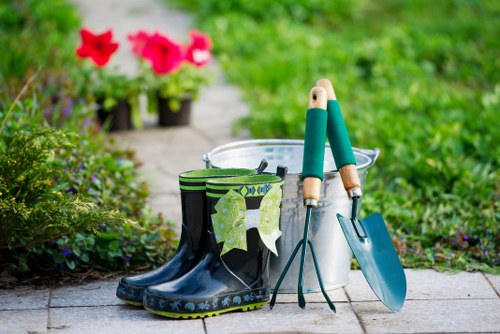
Essential Garden Maintenance Tasks
Lawn Care
A lush, green lawn serves as the foundation of any garden. Proper lawn care involves mowing, watering, fertilizing, and aerating to maintain healthy grass growth.
Mowing: Regular mowing helps keep your lawn neat and encourages even growth. It's recommended to mow your lawn at a height of about 2.5 to 3 inches, removing no more than one-third of the grass blade length at a time.
Watering: Deep and infrequent watering promotes strong root systems. Early morning is the best time to water to minimize evaporation and reduce the risk of fungal diseases.
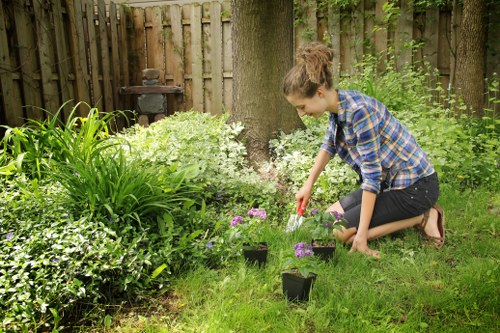
Pruning and Trimming
Pruning is essential for the health and appearance of your plants. It involves removing dead or diseased branches and shaping plants to encourage growth.
Regular pruning helps prevent the spread of diseases, improves air circulation, and allows more sunlight to reach the plants, fostering healthier growth.
Tip: Always use sharp, clean tools to make precise cuts and avoid damaging the plants.
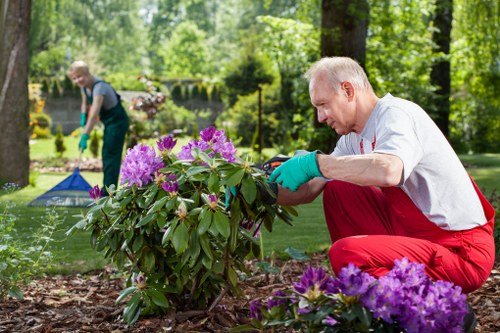
Weed Control
Weeds compete with your plants for nutrients, water, and sunlight. Effective weed control is crucial for maintaining a healthy garden.
Manual Removal: Hand-pulling weeds ensures that the entire root system is removed, preventing regrowth. This method is labor-intensive but effective for small areas.
Chemical Control: Selective herbicides can target specific weeds without harming desirable plants. Always follow the manufacturer's instructions for safe application.
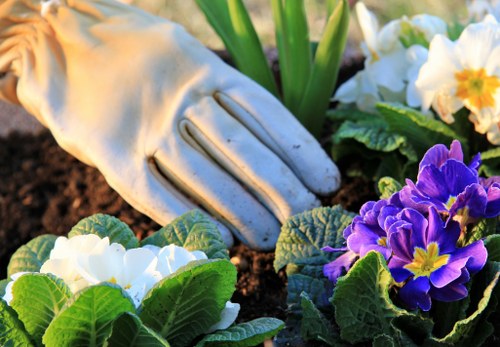
Soil Health and Fertilization
Healthy soil is the cornerstone of a thriving garden. Regular soil testing helps determine its pH and nutrient levels, guiding appropriate fertilization.
Fertilizing: Use fertilizers that match your soil's needs. Organic options, such as compost and manure, improve soil structure and provide essential nutrients.
Soil Amendments: Adding organic matter like compost enhances soil fertility, promotes beneficial microbial activity, and improves water retention.
Seasonal Garden Maintenance
Adapting your garden maintenance routine to the changing seasons ensures year-round plant health and garden beauty. Each season presents unique challenges and opportunities for gardening.

Spring Maintenance
Spring is the perfect time to prepare your garden for the upcoming growing season. Start by clearing any debris accumulated over the winter and pruning dead branches.
Planting new flowers and vegetables, along with fertilizing the soil, sets the stage for a vibrant garden. Regular watering and monitoring for pests are essential during this period.
Tip: Mulching in spring helps retain soil moisture and suppress weed growth.

Summer Maintenance
Summer brings intense heat, making consistent watering crucial. Focus on deep watering to encourage drought-resistant root systems.
Pruning should continue to maintain plant shape and remove any dead or diseased parts. Regularly check for pests and diseases, addressing issues promptly to prevent spread.
Tip: Shade-loving plants may require additional protection from the harsh afternoon sun.

Autumn Maintenance
Autumn is ideal for preparing your garden for the winter months. Begin by harvesting remaining crops and removing spent plants to reduce pest habitats.
Leaf litter should be cleared to prevent fungal growth and improve soil health. It's also a good time to plant bulbs and perennials that will thrive in the spring.
Tip: Compost fallen leaves to create rich organic matter for your garden.

Winter Maintenance
Winter requires minimal maintenance, but some tasks can help protect your garden. Mulching can insulate plant roots from freezing temperatures.
Prune trees and shrubs while they are dormant to promote healthy growth in the spring. Additionally, plan your garden layout and select plants for the upcoming season.
Tip: Use protective covers for sensitive plants to shield them from extreme cold and frost.
Choosing the Right Plants
Selecting plants that are well-suited to the local climate and soil conditions in Cleaners KT6 is vital for successful garden maintenance. Native plants often require less maintenance and are more resistant to local pests and diseases.
- Perennials: Provide long-lasting beauty with minimal annual maintenance.
- Annuals: Offer vibrant colors but may require more frequent replanting.
- Shrubs and Trees: Add structure and height, requiring regular pruning and care.
Consult with local nurseries or gardening experts to choose the best plants for your specific garden conditions.
Pest and Disease Management
Effective pest and disease management is crucial for maintaining a healthy garden. Integrated Pest Management (IPM) practices offer a balanced approach to controlling pests while minimizing environmental impact.
- Monitoring: Regularly inspect plants for signs of pests or diseases.
- Identification: Correctly identify the problem to apply the appropriate treatment.
- Control: Use a combination of biological, mechanical, and chemical controls as needed.
Biological Controls: Introduce natural predators, such as ladybugs, to reduce pest populations.
Mechanical Controls: Use barriers, traps, or manual removal to manage pests.
Chemical Controls: Apply pesticides as a last resort, following all safety guidelines to protect beneficial insects and the environment.
Mulching and Composting
Mulching and composting are two essential practices that enhance soil fertility and moisture retention while suppressing weeds and improving garden aesthetics.
- Mulching: Apply a 2-3 inch layer of organic or inorganic mulch around plants to maintain soil temperature and moisture levels.
- Composting: Recycle kitchen scraps and garden waste into nutrient-rich compost that can be used to enrich garden soil.
Both practices contribute to a sustainable and low-maintenance garden, reducing the need for frequent watering and chemical fertilizers.
Tools and Equipment for Garden Maintenance
Having the right tools and equipment is essential for efficient garden maintenance. Investing in quality tools can make tasks easier and prolong their lifespan.
- Hand Tools: Pruning shears, trowels, and weeders are basic tools for various maintenance tasks.
- Power Tools: Lawn mowers, trimmers, and blowers help manage larger areas with ease.
- Protective Gear: Gloves, hats, and safety glasses protect you while working in the garden.
Regular maintenance and proper storage of tools extend their usability and ensure they remain effective for all your gardening needs.
Creating a Maintenance Schedule
Establishing a garden maintenance schedule helps ensure that all necessary tasks are performed timely and consistently. A well-planned schedule prevents overwhelming workloads and promotes sustained garden health.
- Daily: Watering, checking for pests.
- Weekly: Mowing, pruning, deadheading flowers.
- Monthly: Fertilizing, soil testing.
- Seasonally: Planting, mulching, preparing for winter.
Adjust the schedule based on the specific needs of your garden and the climate conditions in Cleaners KT6.
Benefits of Professional Garden Maintenance Services
While DIY garden maintenance can be rewarding, professional services offer expertise and efficiency that can enhance your garden's health and beauty.
- Expert Knowledge: Professionals understand plant care, pest management, and soil health.
- Time-Saving: Delegating tasks frees up your time for other activities.
- Customized Care: Tailored maintenance plans address the unique needs of your garden.
Consider hiring a professional gardening service in Cleaners KT6 to achieve optimal results and maintain a stunning garden effortlessly.
Eco-Friendly Garden Maintenance Practices
Adopting eco-friendly practices contributes to a sustainable environment and promotes the health of your garden.
- Organic Fertilizers: Use natural fertilizers to enrich soil without harmful chemicals.
- Water Conservation: Implement efficient watering systems like drip irrigation to reduce water usage.
- Integrated Pest Management: Combine biological, mechanical, and minimal chemical controls to manage pests sustainably.
These practices not only benefit the environment but also result in healthier plants and a more resilient garden.
Common Garden Maintenance Mistakes to Avoid
Avoiding common mistakes can save you time, effort, and resources in maintaining your garden.
- Overwatering: Excessive water can lead to root rot and other plant diseases. Ensure proper drainage and adhere to appropriate watering schedules.
- Under-Fertilizing: Neglecting fertilization can result in nutrient deficiencies, stunted growth, and poor plant health.
- Improper Pruning: Incorrect pruning techniques can damage plants and reduce their ability to flower or fruit.
- Ignoring Weed Control: Allowing weeds to grow unchecked can suffocate desirable plants and disrupt the garden's balance.
By being mindful of these pitfalls, you can maintain a healthy and beautiful garden with less hassle.
Innovative Gardening Techniques for Cleaners KT6
Incorporating innovative gardening techniques can enhance your garden's functionality and aesthetic appeal in Cleaners KT6.
- Vertical Gardening: Utilize vertical spaces to grow plants, maximizing limited space and adding visual interest.
- Hydroponics: Grow plants without soil, using nutrient-rich water solutions for a controlled and efficient cultivation process.
- Companion Planting: Pairing compatible plants can improve growth, repel pests, and enhance overall garden productivity.
These techniques not only make gardening more efficient but also contribute to a unique and thriving garden environment.
Conclusion
Effective garden maintenance in Cleaners KT6 involves a combination of regular care, informed practices, and a commitment to sustainability. By following the guidelines outlined in this guide, you can cultivate a garden that is not only beautiful but also resilient and healthy.
Remember, a well-maintained garden is a rewarding investment, providing years of enjoyment and enhancing the overall value of your property.
Contact us today to discover how our professional garden maintenance services can help you achieve the garden of your dreams.


